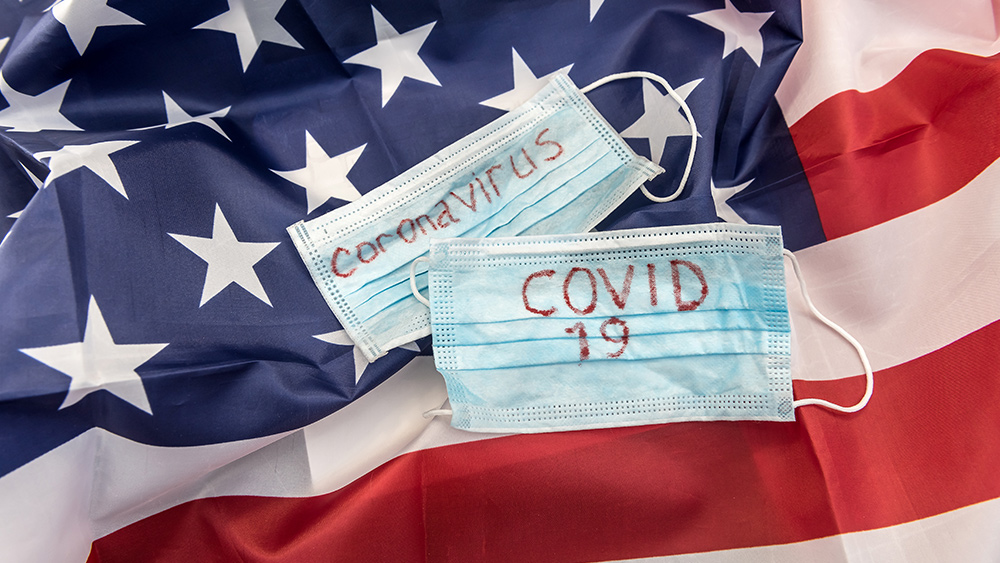US reports first case of COVID-19 reinfection
09/05/2020 / By Ralph Flores

A 25-year old Nevada man is the nation’s first case of COVID-19 reinfection. This makes the U.S. the fourth country to report COVID-19 reinfection. Just last week, the world’s first case of COVID-19 reinfection was reported in Hong Kong, followed by cases in Belgium and the Netherlands. The new case is detailed in an online preprint on the Social Science Research Network. In addition, the study has also been submitted to The Lancet Infectious Diseases.
According to the case, the young adult first tested positive for COVID-19 in mid-April. While he recovered, he got sick again in late May and this time, his illness was more severe. Other cases of reinfection, in comparison, were either milder than the patient’s initial bout or even asymptomatic.
Still, despite what happened to the man in Nevada, it’s too early to draw conclusions on the matter.
“It is important to note, that this is a singular finding,” explained Dr. Mark Pandori, director of the Nevada State Public Health Laboratory and a co-author of the case study. “It does not provide any information to us with regard to the generalizability of this phenomenon.”
Based on genetic sequencing, researchers indicated that the Nevada man’s case is a true reinfection, as he was infected with a slightly different strain of SARS-CoV-2 than his initial infection. It’s still unclear why he was reinfected; a theory that the team is looking at is that the person’s initial exposure to the virus did not give him immunity. (Related: Scientists say coronavirus has higher affinity for human cells than bat cells – does this prove it was laboratory made?)
Reinfection a rare – but real – possibility
Earlier studies on COVID-19 have shown that people generally develop a healthy immune response post-infection. This includes antibodies, which block pathogens from infecting cells, and T cells, immune cells that help wipe out the virus. The body’s immune response also creates “memories” of the virus, protecting the body from a second attack.
This means that people who had a COVID-19 infection are protected from another case for some time. For other coronaviruses, these usually last for less than a year to around three years. Experts, however, are still figuring out how long immunity will last with SARS-CoV-2 until people start getting reinfected. This includes understanding the mechanisms behind a person’s immunity against SARS-CoV-2, as well as measurable levels of antibodies or T cells that signal a person has developed an immunity – better known as correlates of protection.
According to experts, while cases like that of the Nevada man are rare, it still raises the possibility of being infected a second time around.
“The evidence so far suggests that if you’ve been infected and recovered, then you’re protected for some period of time,” added Dr. Ashish Jha, the director of the Harvard Global Health Institute. Jha, who wasn’t part of the case study, also noted that researchers like him are also looking for cases of people that have been reinfected by the coronavirus.
Nevada reinfection is unique
It’s worth noting that immunity doesn’t just vanish – it loses its strength over time. According to experts, this means that the body may not be able to defend against the virus, but it may prevent a person from getting really sick. The COVID-19 reinfection in Hong Kong demonstrates what the immune system is supposed to do, they added. The man initially had a mild case of COVID-19, but he was asymptomatic the second time.
“You’d expect the second time around people to have much milder or ideally no symptoms,” said Jha.
But that wasn’t the case with the Nevada reinfection. According to the researchers, the man showed typical symptoms – headache, cough, sore throat, nausea and diarrhea – during his initial bout with COVID-19. His symptoms cleared up after 10 days, and he tested negative for the virus. A month later, however, he reported feeling sick again with the same symptoms – plus dizziness. Unlike his first infection, his symptoms did not clear up. In fact, these became markedly worse, as he needed help breathing after his oxygen levels fell dangerously low. He tested positive again for SARS-CoV-2, the virus that causes COVID-19.
But if the current trend of reinfections means that a person can be reinfected in such a short amount of time, it can spell trouble for vaccine developers, Pandori added. “After one recovers from COVID-19, we still do not know how much immunity is built up, how long it may last, or how well antibodies play a role in protection against a reinfection.”
The U.S. currently has over 6 million COVID-19 cases and more than 183,000 deaths, according to data from Johns Hopkins University.
Learn more about the ongoing Wuhan coronavirus outbreak in the U.S. at Pandemic.news.
Sources include:
Tagged Under: coronavirus, covid-19, immune system, infections, Nevada, outbreak, pandemic, reinfection, virus, Wuhan coronavirus
RECENT NEWS & ARTICLES
ImmuneSystem.News is a fact-based public education website published by Immune System News Features, LLC.
All content copyright © 2018 by Immune System News Features, LLC.
Contact Us with Tips or Corrections
All trademarks, registered trademarks and servicemarks mentioned on this site are the property of their respective owners.




















